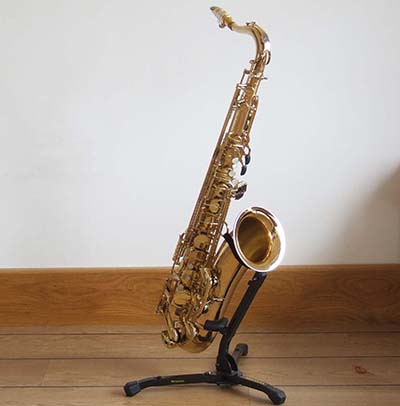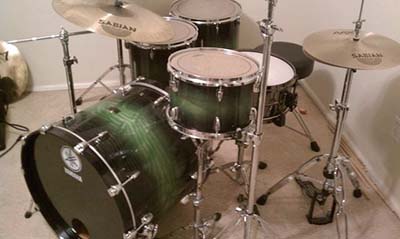
Andy Davey
Andy first played a plastic toy sax at the age of five. Easily damaged and missing the other seven notes of a scale, Andy's musical imagination went missing.
Despite school piano lessons for a military assault on Für Elize and years of self taught guitar on an instrument from a Majorcan souvenir shop his interest in the sax, thought lost, finally reappeared 50 years later.
He took lessons and joined Saxminster, Eight To The Bar, and Black Coffee. Now with the opportunity of multiple notes Andy often returns to some of his compositions from those earliest years.

Despite impressively unmusical parents, Olivia became a keen recorder player at primary school. After breaking numerous bones falling off ponies, a musical instrument became a safer option so she soon started learning the clarinet when moving to The Woodroffe School aged 11. From here, she became desperate to be a part of the school's successful jazz band, picking up the tenor saxophone.
Olivia went on to study Music at the University of Chichester, performing
in various orchestras and pit bands. Graduating a few years later, the
saxophone was replaced with a backpack and Olivia spent two years in
Australia and New Zealand.
With feet now firmly back in Devon, the saxophone has made a reappearance
- this time a larger model in the baritone (well-proportioned to the
player.)

Gifted a musical typewriter
one Christmas as a small child, Carrie tapped away enthusiastically and
later, innocently believing no-one could hear her, she sang those same
nursery rhymes out of the car window on a family day out, with very
negative feedback. She progressed to the descant recorder (oh, joy) and
finally chose a more melodic route by learning the classical flute and
piano. Aged 14, she gained RSM Grade VIII (Dist) Flute and enjoyed playing
with the county orchestra, wind bands and small ensembles and also sang in
various choirs and a Gospel quartet. With diverse musical heroes that
included James Galway and Ian Anderson (flautist with Jethro Tull),
she explored Folk/Rock, Classical, Soul and Pop with equal gusto. Jazz and
Blues came much later.
Fast forward almost forty years, during which time Carrie had constantly
listened to but only occasionally sang or played music, she was introduced
to the soprano sax by a friend and was immediately raring to take on an
exciting new challenge. The ensuing years have been musically fulfilling,
playing various saxes with Saxminster, The Dorchester Big Band,
Black Coffee Sax Quartet and other impromptu ensembles, including
some enjoyable folk(ish) arrangements by Jon Garvey performed with his
Dexterous Friends.
To Carrie, The Rock Section is pure indulgence in the form
of cleverly-arranged songs of her youth, that she gets to ’sing out loud’
on her alto sax and flute alongside talented friends, hopefully, all these
years later minus the tuneless, repetitive rhymes of her childhood!

Brian originally studied piano but fell in love with the saxophone when he found an old "Chu Berry" Conn tenor saxophone lying in the downstairs coat cupboard at home. Inspired by his dad who played alto saxophone in his own dance band, Brian was initially drawn to West Coast big band jazz; bands such as The Don Ellis Orchestra and Buddy Rich Big Band.
There followed a
spell of playing tin whistle and harmonica while singing in a 1970's folk
music band that never seemed to quite take off. Other influences range
from jazz-rock fusion music to Bach toccatas and fugues.
Brian met the other band members when playing in Saxminster. When
not playing in The Rock Section he plays tenor sax in the
South Devon Big Band and also a local concert band.

Jon Garvey
Jon was previously with Andy in the wind section of Eight to the Bar, playing tenor sax and guitar, and has for a number of years played soprano and sopranino sax in Saxminster, for which he also arranges. Prior to all that he has been a solo singer-songwriter, a church musician, a lead guitarist and vocalist, and has done session recording work at a distance for old friend and singer-songwriter Martin Stirrup.
His first instrument was classical violin, but his father was a semi-pro tenor sax player, his brother a professional percussionist and his hero Hank Marvin. Taking up guitar as a teenager he really wanted to be in a progressive rock band, but somehow ended up doing acoustic folk instead. That can be remedied in The Rock Section.
In this band he favours an old but upgraded Hohner Telecaster, an Alvin Davies Pacific Resonator for slide, and his late father's venerable 1937 Martin tenor sax.
PJ Marlin
Philip Jenkins Marlin was classically trained as a lutenist in the
Coldstream Guards' official early music group, Squadrill. In this
capacity he entertained troops in the Gulf and, latterly, in Afghanistan
through a series of Consort Parties, and Squadrill then became the
house band for the Naval and Military Club in St James Square,
London.
Finding his talents less in demand when he moved to Civvy Street, PJ took
up bass, initially in the East London thrash metal outfit Barotrauma
and then in a ceilidh band in Maldon, Essex, where he also worked as a
demonstrator for Trace-Elliott bass amplifiers until the post was
abolished for health and safety reasons.
Since moving west after successful ear surgery, PJ has been much in demand as a session player, and has also generously given his time to a number of Jon's solo projects before recording bass parts for The Rock Section.

Nick was born in Brooklyn, New York, and learned his drumming skills in the School of Hard Knocks, from which he graduated magna cum laude in 1995 with a degree in Percussive Arts. He has eclectic musical tastes, playing all kinds of jazz, soul, punk-rock, salsa, pop - in fact anything (to use his own words) which he can fake well enough to be paid for.
His day job as a dog-walker (he has two fine Yorkshire terriers of his own, Ludwig and Premier) gives him ample time to work on the sometimes complex drum parts for The Rock Section, but restricts his ability to join us on gigs.
Nick has a collection of several hundred drummer jokes, of which he has forgotten all the punch-lines.